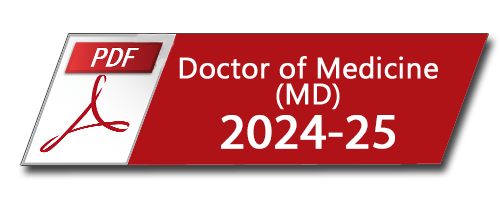Pre-Medical Sciences (I & II Year - Semester I to IV)
This educational track that undergraduates pursue, involves activities that prepare a student for preclinical and clinical sciences in the medical school such as pre-medical science coursework, volunteer activities, clinical skills, research and the application process. It has a total of 72 credits and includes English, Health Sciences Communication in Arabic, Emirates Society, Cell Biology, Human Biology-I, II, Research Methodology-I,II, Health Sciences Communication in English, Islamic Culture in Medicine, Health and Nutrition, infection control, Information Technology and Innovation, Clinical Skills-I, Medical genetics, Biostatistics, Bioethics and Professionalism, Psychology & Behavioral Sciences, Career and Professional Development and Innovation and Entrepreneurship.
Course Description
Year I
Course Description:
This course is designed to provide basic knowledge of human anatomy, physiology and biochemistry to the first year premedical students. This course explains the concepts and functions of basic tissues of human body, biomolecules and human physiology. These foundation principles are to support the year 1 premedical students to better understand the human body in health and disease and prepare the students for system-based learning of medicine in subsequent years.
Course Description:
This course provides first-year medical students with basic knowledge of the principles of cell biology required for the practice of medicine. These foundation principles of cell biology are to support the study of the human body in health and disease and prepare the students for system-based learning of medicine in subsequent modules. The primary advantage of Cell Biology curriculum is that it focuses on the basic knowledge that a physician will use "to diagnose and treat diseases, with the understanding of the internal organization of the eukaryotic and prokaryotic cell, membrane function, cell-cell signalling. The course will also cover important cellular processes such as cell cycle regulation, and apoptosis and attempt to relate defects in these various cellular processes to human diseases to help gain a better understanding of what happens when cells don’t work as they should.
Course Description:
The research process is the cornerstone for informed and effective decision-making to improve health and the effectiveness of their health systems. The course is emphasizing on the understanding of the main elements of the scientific research process. It will encourage students to understand how to conduct the research in their practice; seek the answers for the questions in the current practice in their field as well as base their professional practice on emerging evidence from research. Learning is facilitated through interactive lecture sessions, group discussions, self-directed learning and demonstrations.
Course Description:
This course provides first-year medical students with the basic principles and practice of infection prevention and control (IPC). IPC is a main challenge for health care systems around the world and there is a significant prospect to decrease unnecessary morbidity and mortality through developments in IPC. Health care-associated infections (HAIs) and antimicrobial resistance (AMR) can be significantly reduced through effective IPC. The course will help prepare students as future medical graduates to summarize the most prevalent risk factors for HAIs & recognize appropriate situations where it is necessary to apply these measures. Further, the course will help the students to apply all IPC measures in their daily activities and their households.
Year II
Course Description:
This course provides second-year medical students with basic knowledge of the principles underlying the practice of medicine. These foundation principles are to support the study of the human body in health and disease and prepare the students for system-based learning of medicine in subsequent modules. The basic principles & basic concepts of Medical Microbiology & Immunology, Pathology and Pharmacology related to humans will be covered in this module.
Course Description:
Learning of clinical skills during preclinical year empowers the students to acquire the skills that facilitates them to communicate and interact well with patients and perform physical examination on them. They get the early exposure with these core and important professional skills in a simulated environment that make them confident and comfortable while dealing with real patients during clinical years.
Course Description:
This course provides premedical students with basic principles of research methodology relevant to the practice of medicine and research. Research methodology deals with application of scientific principles to the design and analysis of experimental studies. This course covers the skills required for writing a research project. Topics covered include basics of qualitative an quantitative research designs; PICO model, protocol writing, ethics guidelines manuscript writing and bibliography tools.
Course Description:
This course provides second-year medical students with basic knowledge of the principles of medical genetics required for the practice of medicine. These principles of medical genetics are to support the study of the human body in health and disease and prepare the students for system-based learning of medicine in subsequent modules. This course will also teach concepts and experimental methodologies of molecular and medical genetics. This course will cover perspectives in medical genetics, human genome, nucleic acid structure and function, chromosomes, evolution of classical and non-classical patterns of inheritance, molecular genetic pathology, biochemical genetics, epigenetics, pharmacogenomics and laboratory methods for genetic analysis, genetic screening, genetic counselling and molecular genetic research approaches to the study of human genetic disease using humans and model organisms.
Course Description:
This course provides second-year medical students with basic principles of biostatistics relevant to the practice of medicine and medical research. Biostatistics deals with application of statistical principles to the design and analysis of biological studies. This course covers the theory, methods, and specific software, used in contemporary biostatistics. Topics covered include basics of data types, descriptive and analytical measures; hypothesis testing; t test; chi square test; analysis of variance (ANOVA), power analysis, linear regression, multivariate statistics. Thrust area includes using the GraphPad and SPSS for statistical analysis.
Course Description:
The biomedical ethics & professionalism course introduces students to the ethical dimensions of clinical medicine and the related sciences. It offers them basic language and methodology to critically examine these dimensions. The course format integrates lecture and active case discussion to provide both the necessary philosophical grounding and the real-world skills sought by students. This course will provide an introduction to basic ethical theory and various approaches to clinical ethical decision-making. Students will also be engaged in particular ethical issues in research. This course carries 3 credits, of which 2 are for theory and 1 is for the applied session. The course duration is 15 weeks.
Course Description:
This course introduces the basic concepts of nutrition and build concepts for subsequent years of study. This course will cover various Biochemical aspects of vitamins and minerals, functions, dietary requirements, and importance to the body. It also highlights importance of basal metabolic rate, dietary fiber, and pharmacological aspects of nutrition with over view of pathological aspects of important diseases. It lays foundation aspects of knowledge of nutrition which is vital for the prevention, management, and treatment of many diseases. The course will be completed in 15 weeks and will be assessed by In-course assessment (ICA) and end semester examinations.
Course Description:
In a complex and competitive modern world, there is a growing need for the development of soft-skills to enhance one’s performance in personal and professional life. In addition, prospective employers require students to have attended career and professional development sessions during the course of their study program. This course will help develop soft-skills of medical students and includes the topics of stress and anxiety management, study skills, overcoming procrastination, and dealing with peer pressure. These soft skills will enhance students’ performance in their future career as well as in their personal life. This course will equip medical and health science students with soft skills through presentations, activities, and role-playing, to enhance their performance as students and as professionals in their future careers. The course enhances the self-care of medical and health science students and thus enables them to provide effective medical and healthcare at the workplace.
Course Description:
Medical Innovation and Entrepreneurship is a two-credit course offered in fourth semester of the second year of Medical program. The goal of the course is to focus on assisting the students to acquire a practical approach on how to transform a novel idea into a successful commercial product and application of knowledge to identify real-life healthcare gap in the community and at corporate level by establishing and managing innovation-driven organizations. The course also encourages students to understand how to evaluate the opportunities to design new medical products and organizations that solve problems or make patients’ lives better; seek the knowledge of building teams to manage and lunch new venture. Learning is facilitated through interactive lecture sessions, group discussions and self-directed learning.
 Contact Us
Contact Us
